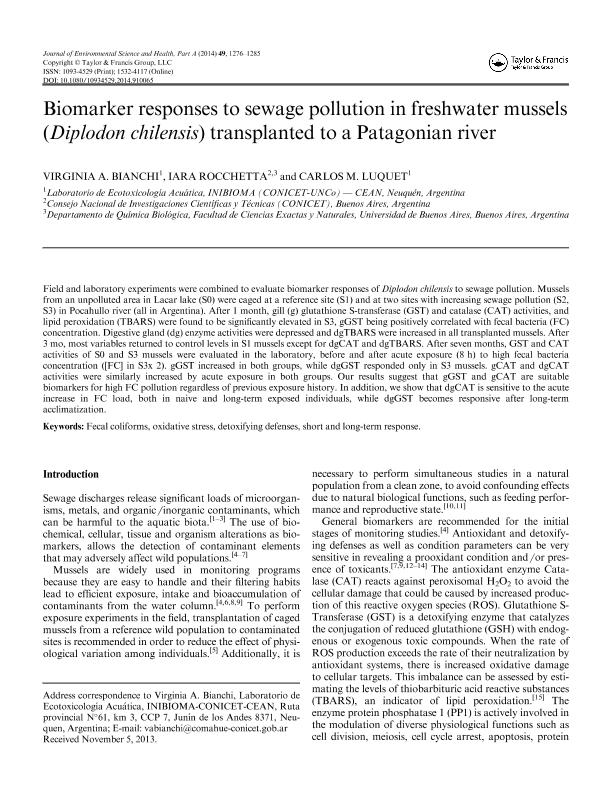Artículo
Biomarker responses to sewage pollution in freshwater mussels (Diplodon chilensis) transplanted to a Patagonian river
Fecha de publicación:
2014
Editorial:
Taylor & Francis
Revista:
Journal Of Environmental Science And Health Part A-toxic/hazardous Substances & Environmental Engineering
ISSN:
1093-4529
e-ISSN:
1532-4117
Idioma:
Inglés
Tipo de recurso:
Artículo publicado
Clasificación temática:
Resumen
Field and laboratory experiments were combined to evaluate biomarker responses of Diplodon chilensis to sewage pollution. Mussels from an unpolluted area in Lacar lake (S0) were caged at a reference site (S1) and at two sites with increasing sewage pollution (S2, S3) in Pocahullo river (all in Argentina). After 1 month, gill (g) glutathione S-transferase (GST) and catalase (CAT) activities, and lipid peroxidation (TBARS) were found to be significantly elevated in S3, gGST being positively correlated with fecal bacteria (FC) concentration. Digestive gland (dg) enzyme activities were depressed and dgTBARS were increased in all transplanted mussels. After 3 mo, most variables returned to control levels in S1 mussels except for dgCAT and dgTBARS. After seven months, GST and CAT activities of S0 and S3 mussels were evaluated in the laboratory, before and after acute exposure (8 h) to high fecal bacteria concentration ([FC] in S3x 2). gGST increased in both groups, while dgGST responded only in S3 mussels. gCAT and dgCAT activities were similarly increased by acute exposure in both groups. Our results suggest that gGST and gCAT are suitable biomarkers for high FC pollution regardless of previous exposure history. In addition, we show that dgCAT is sensitive to the acute increase in FC load, both in naive and long-term exposed individuals, while dgGST becomes responsive after long-term acclimatization.
Archivos asociados
Licencia
Identificadores
Colecciones
Articulos(INIBIOMA)
Articulos de INST. DE INVEST.EN BIODIVERSIDAD Y MEDIOAMBIENTE
Articulos de INST. DE INVEST.EN BIODIVERSIDAD Y MEDIOAMBIENTE
Citación
Bianchi, Virginia Angélica; Rocchetta, Iara; Luquet, Carlos Marcelo; Biomarker responses to sewage pollution in freshwater mussels (Diplodon chilensis) transplanted to a Patagonian river; Taylor & Francis; Journal Of Environmental Science And Health Part A-toxic/hazardous Substances & Environmental Engineering; 49; 11; -1-2014; 1276–1285
Compartir
Altmétricas




